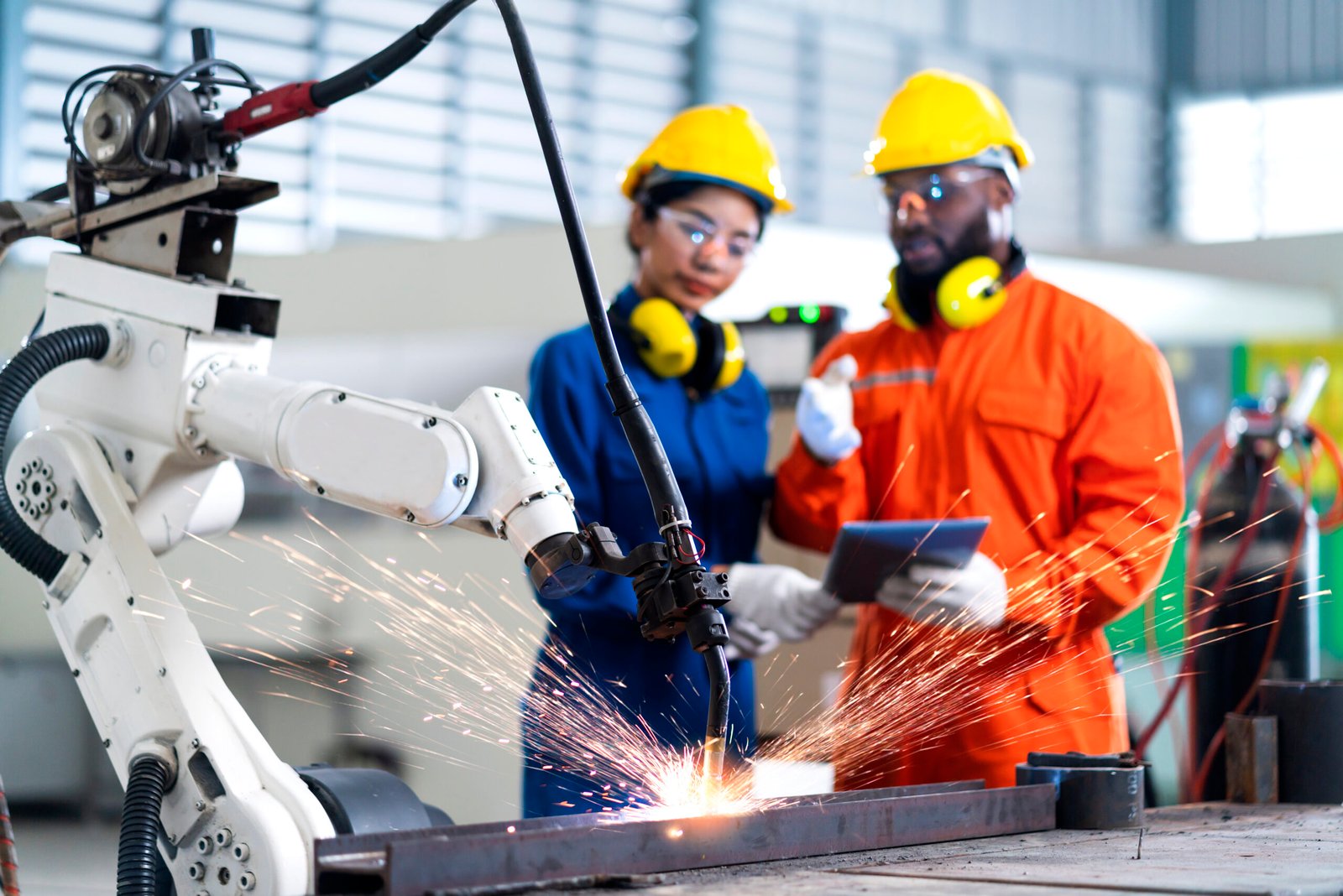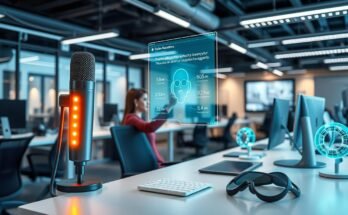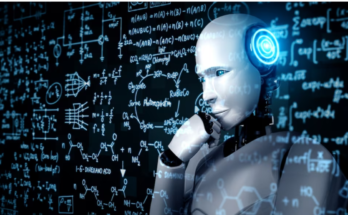Transforming the Future of Work
AI has the ability to process and analyze huge amounts of data, recognize the patterns, and make the correct decisions, which previously were impossible to do at the accuracy and speed of analysts. AI revolutionizes the entire industry.
Applications of AI in Business
Customer Service and Support
The implementation of AI-driven chatbots and virtual assistants in customer service has been omnipresent. These tools serve various functions such as answering customers’ questions they ask very often to more complex matters and at the same time provide 24/7 support. Chatbots use NLP to simulate human conversation and respond to questions fast and accurately, therefore decreasing the need for customer support agents in customer service. As an example, companies such as Amazon and Bank of America have employed AI chatbots to streamline customer interactions. They are in charge of answering routine queries as well as learning from each interaction, thus getting better over time.

Marketing and Sales
AI has a positive impact on marketing strategies through data analytics and predictive modelling. Businesses use AI to the proper management of own data, segment audiences and create highly segmented marketing campaigns that fit each part of an audience. The AI algorithms could locate the popular trends and customer’s preferred products thus these companies putting their marketing efforts only on the most fruitful ones. For instance, AI-driven platforms like Google Ads and Facebook Ads utilize machine learning to optimize ad placements and targeting, ensuring that advertisements reach the most relevant audiences. With conversion rates going through the roof and marketing ROI increasing, marketing becomes more efficient and cost-effective.
Supply Chain and Logistics
AI-induced efficiency in managing the supply chain involves accurate demand prediction, inventory rationalization, and improved logistics. AI-driven Predictive analytics efficiently provide companies with information about the projected market demand, inventory, and suggest the best supply chain strategies. The likes of Walmart and DHL are using AI to manage their supply chains in the most optimized way. AI models are very good at processing historical data to forecast real-time inventory and delivery routes optimizations. As a result, costs are reduced and delivery schedules are more predictable.
Human Resources and Recruitment
AI eases the burden of hiring by automating candidate screening, resume parsing, and interview scheduling. AI-driven tools are able to re-invent the process of resume analysis, match candidates with job descriptions, and thus save time and effort in the hiring process. Platforms like LinkedIn and HireVue utilize AI to assist recruiters in narrowing down top talent and conducting virtual interviews. Also, in terms of eliminating biases in the hiring process, these tools provide the possibility by sticking to the objective criteria rather than making subjective judgments.
Financial Services
AI is the panacea in the financial sector which is used as the shield for the detection of fraudulent activities, a tool in the augmentation of risk management, and an assistant in sophisticated investment analysis. Machine learning algorithms analyze transaction data for odd patterns that may be fraud and can send alerts to financial institutions on suspicious activities. Moreover, AI can be employed in the area of algorithmic trading to analyze stock market trends and make quick trades. Besides, JPMorgan Chase and Goldman Sachs are gaming with AI to boost their tradings and marketing strategies through attaining key indicators and analysis of the cryptocurrency market and thus they drive into the crypto market.
Manufacturing and Automation
AI-driven automation changes and improves the manufacturing process by enhancing efficiency and quality. Machines and AI systems can complete the assistance of performing repeated tasks, checking the equipment’s condition, and detecting the problems/defects in real-time. For example, Tesla and Siemens ensure rapid and precise production with AI-supported robots in factory lines. Predictive maintenance, supported by AI, prevents equipment breakdowns by extracting sensor data and estimating when maintenance should be carried out.
Benefits of AI in Business and Industry

Increased Efficiency and Productivity
AI technology renders formerly routine work automated tasks and ensures that human resources can concentrate on more demanding and strategic activities. This strategy results in improved output and effectiveness. As an example, AI-powered automation in the manufacturing sector can reduce downtime and enhance production levels.
Enhanced Decision-Making
AI guidance for businesses comes in visual data and predictive modeling analytics, which would help decision-making. Running on large datasets, AI will be able to pinpoint major conclusions, make long-term predictions, and suggest real course of actions, because it is statistically real. The overall result is that the strategic planning is sharper and the errors are minimized.
Cost Reduction
Through automating routine tasks, process optimization, and errors reduction AI lowers the overheads of a business. An interesting case of such automation is its implementation into the supply chain to reduce inventory costs and to speed up logistics. This, in turn, will save companies a significant amount of money.
Improved Customer Experience
Implementation of AI in customer services guarantees personalized interactions and reduce the service delivery time, which in turn improves the user experience. Chatbots and virtual assistants take immediate action while suggestions given by AI and targeted marketing increase customer satisfaction and engagement.
Innovation and Competitive Advantage
AI technologies drive innovation mainly through enabling companies to launch new products, offering innovative services, and introducing new business models. Thus, those companies that manage to utilize AI effectively through problem-solving will stand out from among innovators and early adopters, thus acquire the leadership position in the industry.
Challenges of AI Adoption in Business
Data Privacy and Security
The use of AI requires the aggregation, analysis, and presentation of vast amounts of data. This, in turn, gives rise to the problem of data privacy and data security. Organizations have to take care of the data protection regulations and must include high-level security measures to ensure the protection of sensitive information.
Integration with Existing Systems
The adoption of AI by the traditional business bodies might be a complex and a costly process. Businesses are often faced with the problem of compatibility among AI systems and their current systems. To achieve the desired goal, businesses need to plan properly and have the necessary technical expertise.
Talent Shortage
There is a rising demand for AI skills, and professional categories that are the most required are data scientists, machine learning engineers, and AI developers. The deficiency of relevant professionals will slow down the progression and the use of AI in the business.
Ethical Considerations
AI leads to ethical issues such as bias, transparency, and fairness. The application of AI technology could potentially be harmful in terms of making unbiased decisions and being transparent. Hence, to oversee that goals are achieved, firms must continue to ensure that AI systems are utilized within the correct framework and in a transparent manner.
Cost of Implementation
AI implementation becomes costly especially to small and medium-sized enterprises (SMEs) as it requires resources to develop, deploy, and maintain AI systems. In consequence, the implementation costs are often too expensive for some smaller companies.
Future Directions of AI in Business and Industry
Advancements in AI Technologies
The initiative for AI in the business sphere is anticipated to flow from the convergence of technologies in natural language processing, computer vision, and reinforcement learning. The newly developed algorithms will allow for much sharper applications and thus create a new phase of innovation.
AI and Internet of Things (IoT) Integration
AI merged with IoT improves the functionality of smart devices and systems. AI of IoT with its real-time data insights, predictive maintenance, and automation systems will likely change industries like manufacturing, logistics, and healthcare.
Ethical AI and Governance
The design of ethical AI frameworks and governance structures will become increasingly critical. Businesses will be expected to abide by certain ethical standards and best development practices to make sure AI is responsibly and transparently operated.
AI-Driven Personalization
Personalization through AI becomes more sophisticated due to businesses using better customer profiling tools. AI-powered personalization leads to enhanced customer satisfaction and higher engagement rates across the different sectors.
AI and Augmented Reality (AR)/Virtual Reality (VR)
The union of AI with AR and VR will be of great importance in bringing about interactive applications for training, simulation, and customer interaction. AI-powered AR and VR applications open the way for the development of new business models and tools for companies to better involve their customers, as well as improving their own operational efficiency.
Outcome
AI serves as the powerhouse for businesses and industries by increasing efficiency, improvement of decision-making, and innovation. Applications of AI including customer service and marketing up to supply chain management and financial services are rapidly reshaping the business and competition landscape in the contemporary world. The advantages of AI adoption will outweigh the barriers companies will face in this journey, and the next phase will bring more progress and developments.
Despite the great potential for growth in the widespread use of AI technologies, enterprises will also need to deal with the ethical issues, data security, and human capital development through investments. By utilizing AI power, companies will be able to swiftly apply and enact impact generating projects and processes while at the same time provide their customers with better experience and maintain their competitive advantage in a dynamic, data-oriented future. This is only the inception of AI in business and industry, and inevitably, the technology will significantly impact the future of employment and trade for many generations to come



